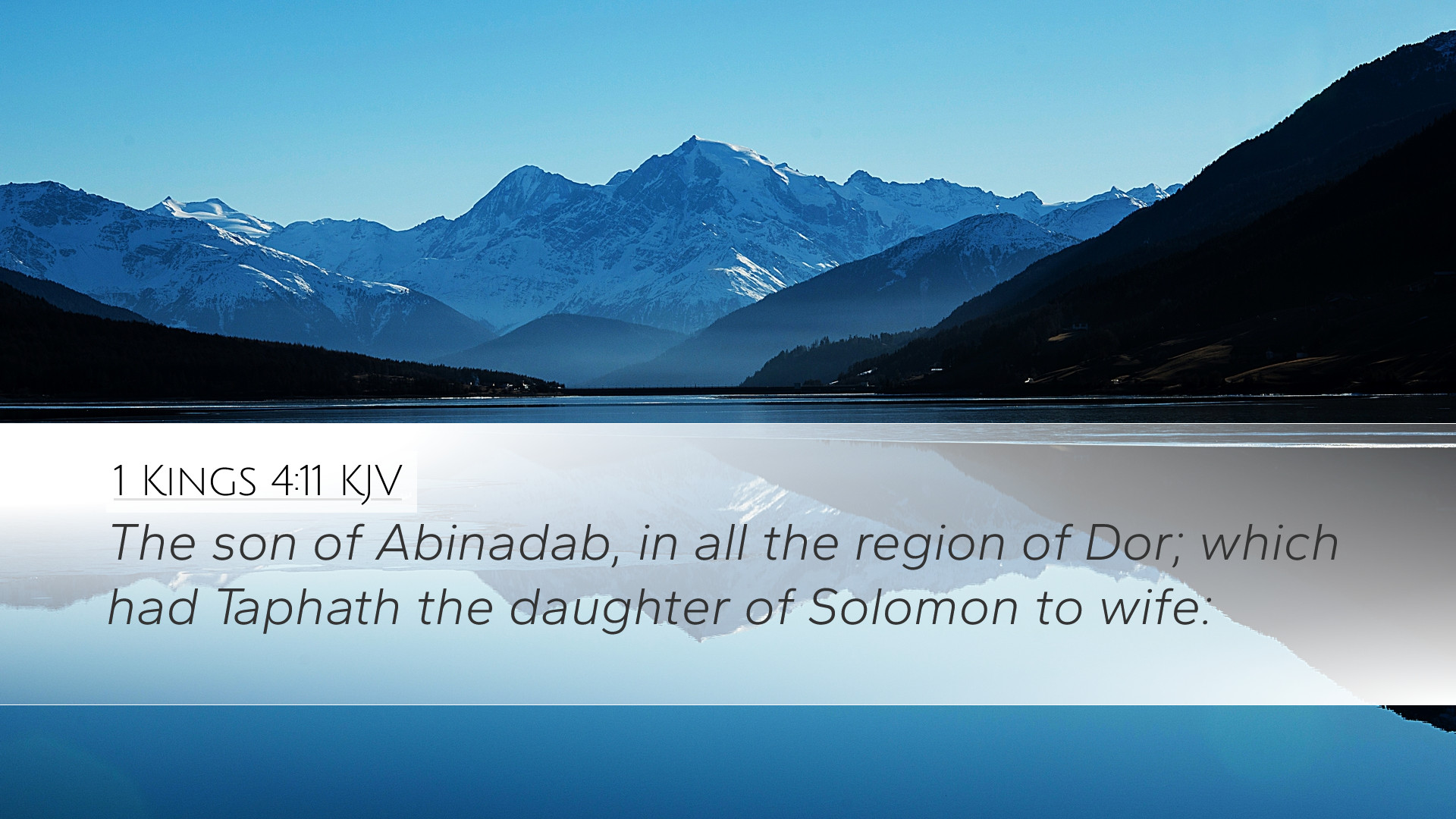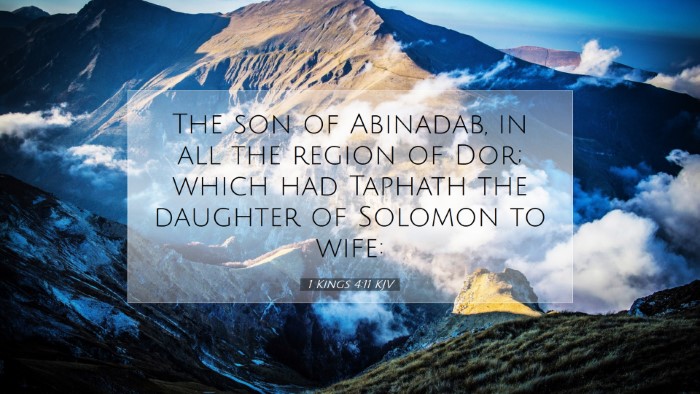Commentary on 1 Kings 4:11
Bible Verse: "Ben-abinadab; in all the region of Dor; he had Taphath the daughter of Solomon to wife."
Introduction
This verse forms part of the account of King Solomon’s administrative structure during a period of unrivaled prosperity and peace in Israel. Solomon organized his kingdom into regions, appointing officers to ensure effective governance. The specific mention of Ben-abinadab as governor of Dor and his marriage into the royal family provides valuable context for understanding the political and familial alliances that characterized Solomon’s reign.
Historical Context
1 Kings 4:11 is significant in understanding the sociopolitical landscape of ancient Israel. Solomon’s reign is often highlighted for its wisdom and wealth, a reflection of the divine blessing he received. The organization of his empire into districts with appointed officials illustrates a system of governance that was both strategic and familial.
- Administrative Structure: Solomon’s appointment of various governors showcases a centralized power, necessary for managing a nation that had grown large and complex.
- Importance of Marriages: Marriages were often used to solidify alliances and ensure loyalty among leaders. Taphath, the daughter of Solomon, illustrates how intermarriage served to politically unite families and territories.
Commentary Insights
Matthew Henry’s Insights
Matthew Henry emphasizes the significance of Ben-abinadab’s position and the implications of marrying into the royal family. He notes that such appointments were based on merit and loyalty, portraying the capacity of Solomon to maintain stability through wise choices in leadership. Henry remarks, “The wisdom of Solomon in his government was shown not only in the choice of the best men but also in securing their loyalty through familial bonds.”
Albert Barnes’ Analysis
Albert Barnes provides insights on the specific geographical significance of Dor, a city located near the Mediterranean Sea, which was a strategic location for trade and defense. He explains, “Ben-abinadab’s governance over Dor illustrates Solomon’s foresight in appointing leaders who could manage economically vital regions, ensuring both security and wealth for the kingdom.” Barnes highlights the interconnectedness of economics and politics in Solomon’s governance, reflecting a sophisticated understanding of administrative responsibilities.
Adam Clarke’s Commentary
Adam Clarke focuses on the personal implications of Ben-abinadab’s relationship with Solomon through marriage. He interprets Taphath’s role as not merely a familial connection but as a symbol of unity among the tribes of Israel. Clarke states, “The marriage alliance demonstrates a deeper strategy to unify the nation under Solomon’s reign, promoting peace and collective identity among the people.” He further sees the marital ties as essential for maintaining loyalty and tranquility within the kingdom.
Theological Implications
The verse reveals core theological themes central to the narrative of Solomon’s reign:
- Divine Wisdom: Solomon's wisdom is manifest in his ability to appoint capable leaders and structure his kingdom, which serves as a reflection of God’s guidance in governance.
- Human Authority and Responsibility: The authorization of leaders under Solomon's reign showcases the Biblical principle of authority and the corresponding accountability that comes with governance. Leaders are expected to act justly and provide for their constituents.
Practical Applications
For pastors, students, and theologians, several applications arise from this verse:
- Leadership and Governance: Understanding the importance of wise leadership and strategic appointments in various sectors today resonates with the principles demonstrated during Solomon's reign. This informs present-day leaders to cultivate environments of trust and competence.
- Family and Alliances: Relationships are to be viewed as critical constructs within any societal structure. Just as marriages served a purpose in unifying tribes, contemporary partnerships, and alliances in ministry can reflect similar values of unity and shared purpose.
- Divine Guidance: The emphasis on seeking wisdom from God in decisions impacting governance and relationships is timeless, reminding leaders to rely on divine insight.
Conclusion
1 Kings 4:11 provides a glimpse into the intricate relationship between governance, family, and faith during Solomon's reign. The verse encourages reflection on how leadership choices resonate throughout history, emphasizing the importance of wisdom, unity, and divine guidance in fulfilling the calling to serve others effectively. Both ancient and modern leaders can learn from Solomon’s approach—embracing wisdom leads to prosperity and peace in any community.


